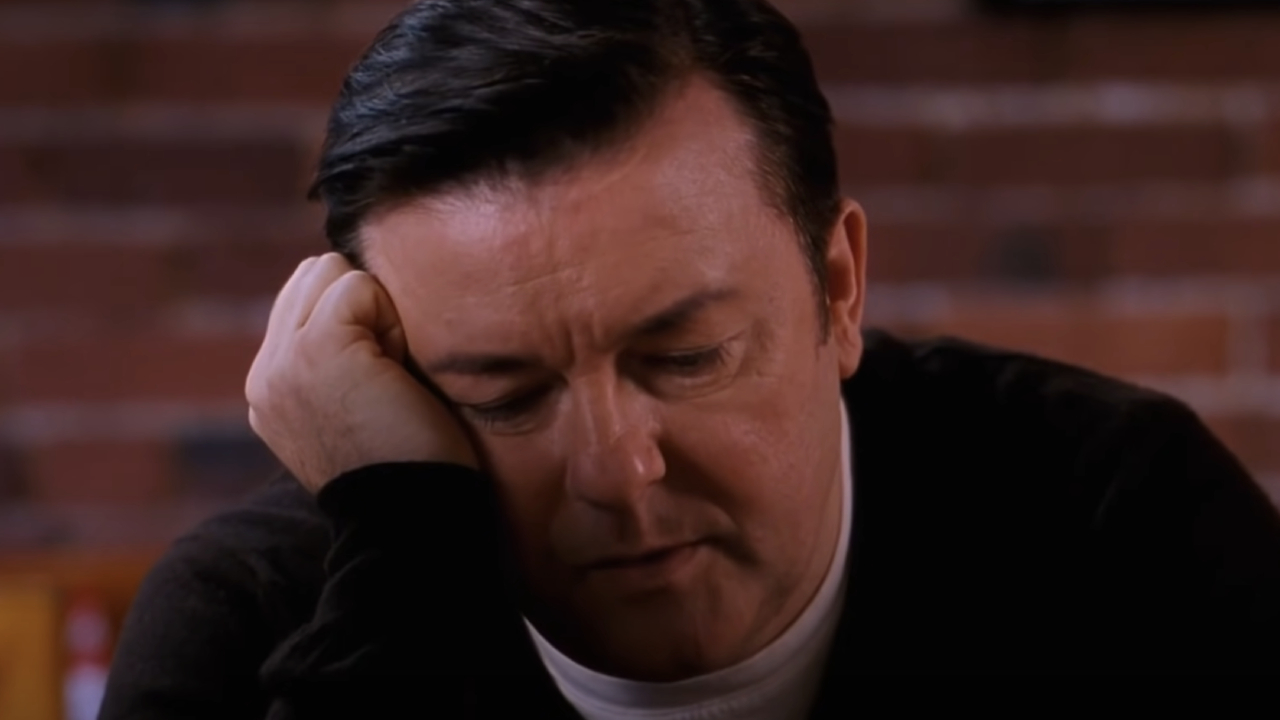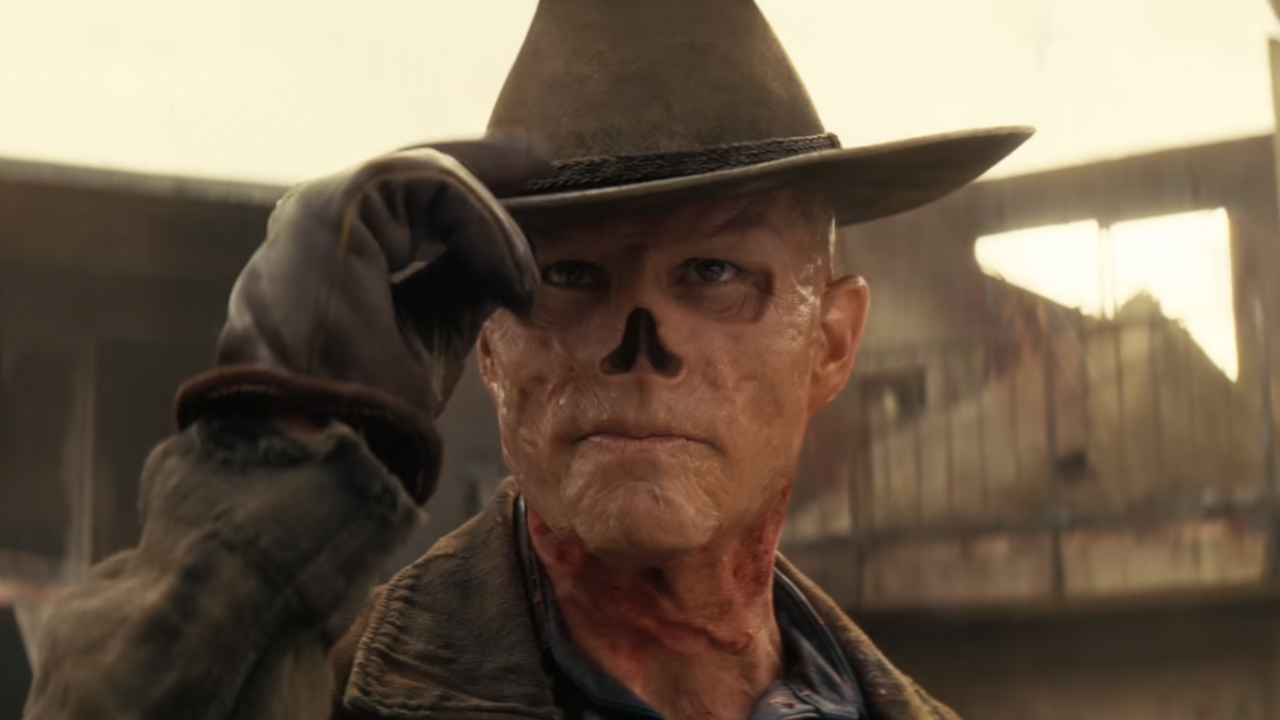Exclusive Interview: The Invention Of Lying Co-Director Matthew Robinson

When some screenwriters get depressed, they give up on the industry entirely. When it happened to Matthew Robinson, he penned a high-concept comedy for his comedic idol Ricky Gervais, and then wound up co-directing it with him. It's the kind of stroke of luck that usually only comes about when you've written a really good screenplay, and Robinson's The Invention of Lying succeeds as a comedy with basic premise-- it's a world in which no one except one man (Gervais) knows how to lie-- and goes in a lot of unexpected directions from there.
I spoke to Robinson earlier this week about the process of writing the film, setting up the rules of what would happen in a world where no one lies, and how a guy with "a fucking Ricky Gervais problem" can wind up sharing directorial duties with the guy. He also explained how there is actually no product placement in the movie, and why fundamentalist Christians should have no problem with the fact that an entire new religion is invented in the movie. Check out our interview below. The Invention of Lying opens today.
You've said that this script came out of a place of depression. Can you talk about that?
it was just one of those low points in a writer's life when they're questioning whether they're really making the right decision by not getting a real job. I had recently been fired from a writing job and hadn't sold anything in 7 or 8 years and was $100,000 in debt. I wanted to propose to my wife, but couldn't afford a ring or anything. It written out of, not desperation, but frustration.
Is this pretty dissimilar to the scripts you were doing before?
Yeah, I had kind of gotten bored of comedy for a while, which I think was a good thing. When I sat down to write this it was like opening up the floodgates. I had ben working on a horror film before that, I had been working on an adaptation of Dostoevsky novel. I had gotten bored of comedy because it was what I did in my early 20s mostly.
There's a fine line in this between a high-concept comedy and coming from a darker place. Can you talk about bringing it away from high-concept in tone, if not necessarily in plot?
Your Daily Blend of Entertainment News
Yeah, well those are ideas I'm usually drawn to, big studio ideas but done in a very small, non-studio way. Those are the things I get most excited about, taking really solid, big ideas, and concentrating on how that would affect the smallest, least significant person in that world.
There's that part of it, and then it goes in this big direction with the creating religion aspect. Did it come out of that same desire to go away from the status quo?
I thought there was no way to avoid that. I needed him to do something heroic, and I thought there was nothing more heroic than creating heaven for your dying mother. It just seemed natural to me that that need and that hope would spread like wildfire. Eventually he would have no choice but to answer questions that the whole world was having. Where I got excited was a total moron having to invent religion.
How did you set up the parameters and the rules of this world?
We set up the rules pretty early on. In terms of when people were honest, the simple rule was, whenever there was an elephant in the room, it had to be addressed. Whenever in our world someone would experience embarrassment or shame, in their world they wouldn't. We wanted people to express things that in our world they wouldn't. If someone in our world would think it, in their world they would say it, if it were a big enough thought to lead to a feeling.
Was it ever part of the plan for you to wind up directing this as well?
It wasn't even in my brain. I was just so enamored to be sitting in Ricky's office in London. He could have offered me $50 and been like, "Can I have the script, and I won't put your name on it, but you'll get to hang out with me in London for a few days?" and I would have been like "It's yours. I'll do it for $20." It was a dream just having him read the script. Originally when I wrote the draft of it, and I hadn't done this before, but I couldn't help but imagine him in the film. I was a massive Ricky Gervais fan. I had a fucking Ricky Gervais problem. My wife had to take the DVDs and hide them at some point. Just finding out that the producer Lynda Obst was going to London to have a general meeting with him, and she was going to try to tell him about the script to see if he would read it as a favor. Just knowing she was doing that was amazing. I remember telling my wife, "Ricky Gervais will know my name in the next few weeks. I can die happy. He will know that I exist in this world."
At a certain point it was very obvious that he wasn't comfortable giving it to another director, and at the same time he wasn't comfortable doing it himself because he was worried that he would not do the script proud. It was just a simple, 'Do you want to help me try and not fuck this up?' And the screenwriting process has gone well, so let's just imagine that the directing will go equally well. Of course I had always dreamed of being a director, it was always an aspiration of mine, but I had always considered myself a writer first.
Had you been to film school at all? Did you have any kind of behind the camera training?
No. I'm not a big fan of film school. I was a massive cinephile my whole life. I was a PA a few times on set, I read the biography of every director I could get my hands on. I watched every movie, I read every book, and really that's all you need. To be honest I learned 95% of it on set.
It seems like if you grow up as a cinephile, you'll want to imitate the greats in your first movie. Is it hard to step back from that?
No, because this one was simple and it would have been hindered by trying to make it flashy. We really wanted to step back and make a really simple, story, dialogue-driven film. We found ourselves stripping away camera movements every day, really getting into the simplicity of the shots. It was based on a desire to keep the film visually as honest and black and white and almost boring as the world was. Then slowly introduce things as the film moved on, and the film ends with a big sweeping camera movement. Of course I watch the film now, and I'm itching to flex my cinematic muscles a bit more. It was easy, because it was about sticking to what the film needs.
What was Ricky's input behind the camera?
We really shared the reins equally, in a full, equal sense. Every decision, everything, from the smallest little prop up to who we cast and where we were going to put the cameras every day, we had to come to an agreement together, on every detail.Sometimes it took a good deal of time to have every detail signed off on for two directors, but it was the only way to ensure that there was nothing in the film that both of us don't love.
There's a lot of product placement in the movie. How did it come to be a part of it?
I think it's so funny when people say, oh God, there's so much product placement in the film. We didn't get a penny. Pizza Hut gave us not a penny. [In the film, when Gervais' character comes up with the laws for his new religion, he presents them on the back of Pizza Hut boxes, a la the Ten Commandments]
Why didn't you get any? You could have.
No we couldn't. We tried, but we couldn't. But it was also a creative decision, so I didn't care. I didn't want to design a fake pizza company. We wanted to keep it in our world. To me, it's just much funnier creating religion on the back of a Pizza Hut box. It almost draws the eye more if it's one that we made up. We went to them and said, well, we want to use them, if they can get us some cash, then they can. I don't think Pizza Hut wants to be on the box in that scene. It's satire rules, so I think we got to use it for that. Coke and Pepsi definitely didn't want to be in the film. It falls under satire law, so we're allowed to do whatever we want.
Have you heard any noise from religious groups about the film?
I hear little things here and there. But I would be surprised if it happened. I can't say it would be bad for the film, but I also don't think it's appropriate. I don't think there's anything blasphemous in there; we're just asking questions. For me, it's the oldest thing in the world, that man has come up with answers as to what happens when he dies. In this world, this less than brilliant man who invented it, this is the best he could come up with. Every civilization has taken a stab at it. I'm definitely not trying to insult anybody. My father is an extremely religious born-again Christian, and I'm extremely respectful of peoples' religious belief.
So is your dad on board with the movie?
He saw it for the first time a few days ago, and he loved it. He's taking his whole church to go see it.
Staff Writer at CinemaBlend

